Taking on Diversity & Inclusion in the Drupal Community
We spoke with Drupal Diversity and Inclusion team leader Tara King about how her team are going beyond the depressing statistics and achieving real change.
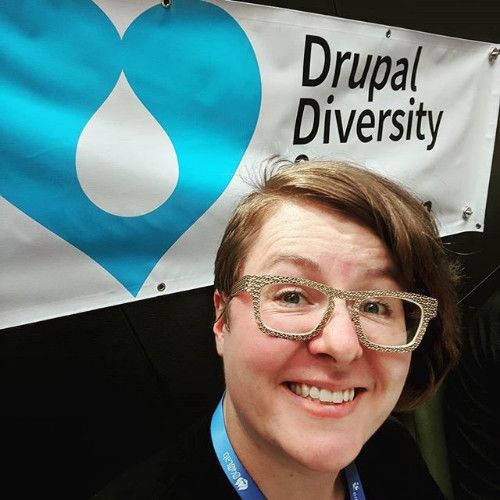
We spoke with Drupal Diversity and Inclusion team leader Tara King about how her team are going beyond the depressing statistics and achieving real change.

How did you get involved?
I started out in print design, then became a content administrator on a Drupal site. I taught myself and became a senior backend developer. I loved the community around the software and the software itself.
I’ve attended a lot of depressing sessions about women in tech over the years. I’d look around and it was only women and people of color in the room. We already knew how terrible it was, because we had no colleagues that looked like us. I would spend the rest of conference sad and angry. I just stopped going to those sessions.
Then Nikki Stevens and Karyn Cassio gave a talk at DrupalCon in New Orleans in 2016 that kicked off something different, which continued at a Birds of a Feather. For the first time, I felt real energy and action around how to improve the Drupal community on these topics.
I sought out the group in the Drupal Slack. It's a very open source kind of story: I just started listening, then someone said they needed a banner design reviewed so I put my hand up. I continued to raise my hand to help out. And now I am the leader of the inclusion team.
The conversations have continued. It's not just once a year at DrupalCon. People are talking in our channel all the time, which I'm learning a ton from. Then I also help other people understand. It's an ongoing commitment that’s really empowering.
Drupal Diversity and Inclusion is designed to support underrepresented people in the Drupal community—people of color, women, LGBTQ folks, all kinds of different people. It’s about making room for us in the open source community.
It feels like a different community than it was three years ago. The DrupalCon planning committee this year is much more diverse and inclusive, from the ground up. It’s super exciting to see change happening. We’re making tangible improvements in people's lives, which improves the community, which improves the software. We’re building momentum.
What is the Diversity and Inclusion Speaker Initiative?
A lot of Camp and event organizers were coming to us saying that they just closed their call for submissions and only got one from a woman. At that point, it's too late. After a series of those conversations, we decided to do something.
If you want more diverse people speaking, you need more diverse proposals. A lot of people who are underrepresented in the community don't submit proposals at all. Imposter syndrome is common. When you don't see yourself represented on stage, you don't imagine that you can be up there.
When you're marginalized, it's harder to get a job because people don't take you seriously. So maybe you think going to a conference will bolster your connections. But that's like two grand out of pocket. Travel expenses are a huge investment. If you can’t attend, you can't submit a talk. It all compounds.
In the WordPress community, Jill Binder has been doing trainings aimed at underrepresented people about imposter syndrome and finding the courage to stand up, and she’s having great success. It also covers the nuts and bolts of how you actually prepare a pitch.
WordPress and Drupal are like cousins in some ways, technically speaking, and they're very similar culturally. So we're having Jill come into the Drupal community to teach people online, and to run a train the trainers course for Camp organizers.
We’re hoping to give people the opportunity to speak at local events and build from there. If we have better diversity at Camps, I think that's going to have a huge impact regionally and nationally.
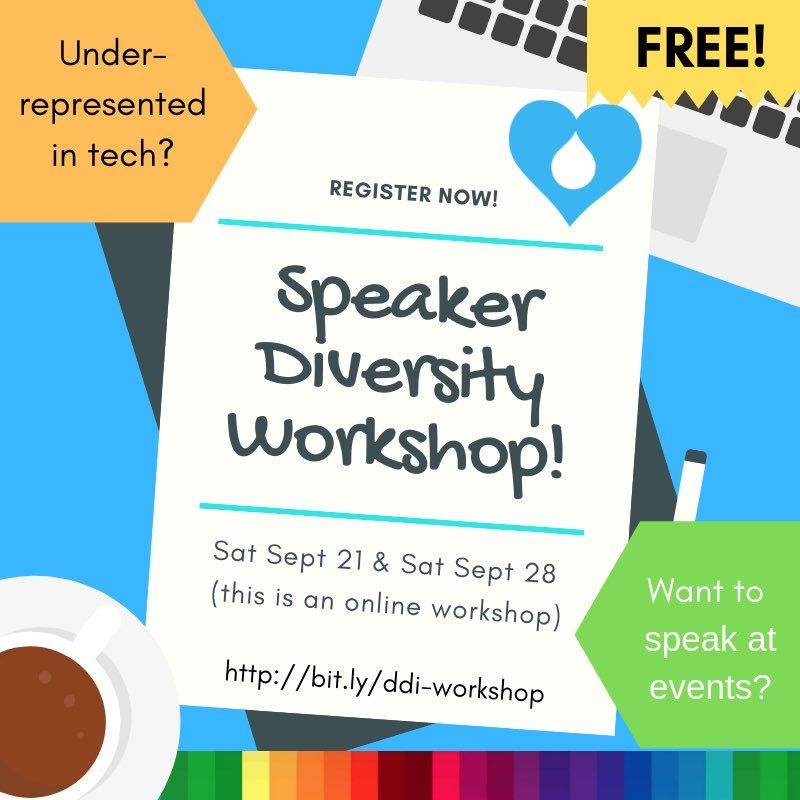
What challenges have you faced doing this work?
Around 2017 there was a very controversial decision to remove a prominent Drupal contributor from certain leadership roles based on some beliefs that he holds. It became a flashpoint for the community. It was a hard time for everyone in the Drupal community, no matter what side of the decision you fell on.
Drupal diversity inclusion ended up being ground zero for conversation around that issue, even though we had absolutely no power or knowledge related to any of it. We grew from 70 to 400 people. But they weren't all allies. It was a mix of those just trying to figure out what was going on and people who were antagonistic.
It caused a lot of burnout in our group, the effects of which are ongoing. There’s still a lot of skepticism that anything will ever change. I mean, does anyone really want to have to develop the skills to deal with online trolls? I think that a lot of folks we dealt with during all that drama were intentionally trying to burn us out.
The speaker diversity initiative has had a lot of traction. It's getting shared by the head of the Drupal project and major agencies. The community seems ready for it and willing to go there. But we're constantly making sure that we're not just driving into a brick wall over and over again, which is what it can feel like sometimes. It’s frustrating when we as individuals can't change the big systemic problems.
All of open source has a sustainability and burnout problem, and yes it's tough when someone gets mad for like not liking your code. But it's another thing to feel like you're defending your own humanity and right to sit at the table. That can be really damaging.
We’re choosing some things to focus on first, to reduce that damage. We can demonstrate that, in fact, it's not hard to get diverse speakers if you do the work. We’re reminding people that they can give these talks and they can accept these talks. It is a long haul, and it's not going to be fixed tomorrow, though I wish it were.
Why did you start fundraising?
We’ve considered becoming part of the Drupal Association, the non-profit that looks out for Drupal. But our independence is really important. We need to be able to say when something is wrong or not helping. That requires financial independence.
We didn't have any money at all until very recently. We coordinated ad hoc support for things like pronoun stickers for badges at DrupalCon, because nobody else was doing it (thankfully, Drupal Association has now adopted that and will pay for it).
Ultimately, the ad hoc approach was not sustainable. We had to restart the discussion about funding stickers every single year. It was so much heartache for such a small amount of money.
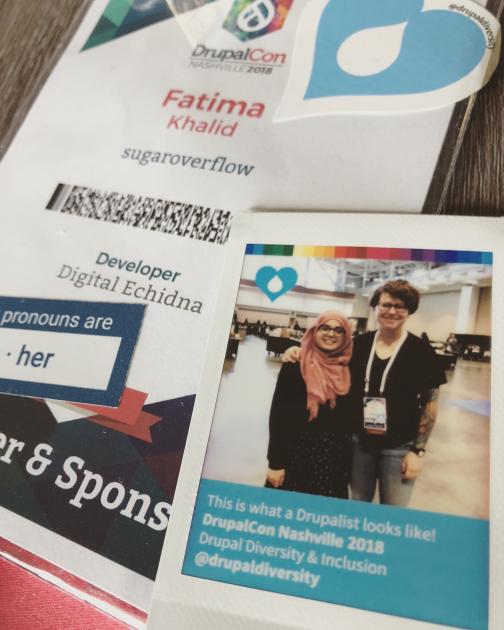
My current job with Pantheon will pay if I get accepted to give a talk, which is fantastic. But other people can’t get that kind of support, or even get the time off. It’s compound further because a lot of our leadership team are underrepresented in the highest paying jobs. We were confronting the reality of shouldering all these burdens personally.
We coped without money for three years. But then we started getting bigger requests, like traveling to give talks at events in other states and countries. Companies were approaching us wanting to sponsor. There were a lot of questions about how to deal with taxes, providing invoices, and keeping it all transparent.
We decided we needed a solution. Open Collective had been talked about in the Drupal community, so we looked into it. Our Collective lets us show what's going on: this is where the money’s coming from, this is where the money's going to. They take care of taxes, invoices, and processing payments.
It’s been a huge lifesaver. This year we did stickers, a photo booth, and a big banner with our name on it. Shipping that stuff gets expensive, and the ability to pay for our conference expenses has been amazing. And then we have the speaker diversity training, which had a matching fund from Pantheon. It’s going to be a huge deal.
Now we're like, oh, wow, we have money. Never thought that would be a thing. We can actually dream a little bigger than we used to.
Would you like to increase your budget?
Even now, a lot of the specific individuals on the leadership team are enabled by support from our employers. Community diversity and inclusion work is built into my job description, which makes me feel like the luckiest person on earth. Other folks have education budgets or different ways of paying for things.
But many people don’t have that kind of support. I would love to be able to afford even token stipends to recognize the huge amount of free labor. I want people to be able to pay bills with that money. There's no way you could pay for the amount of work that actually goes in, but a little can make a difference. It would be a sign that the community and companies care about this work. Part of the emotional burnout is also related to the fact that everyone's an unpaid volunteer.
Currently, the Drupal Association contributes to us monthly, and a couple of agencies support us, many of which employ people on our team. There’s a training school that focuses a lot on diversity and inclusion who’s been backing us for a while. The founder of the Drupal project backed us for the speaker diversity initiative. So we have a mix.
I would love to see more individuals giving. There are so many people in the Drupal community. We don't need everyone to give $500—just a couple bucks a month. That would go a long way toward establishing our work as truly community-wide.
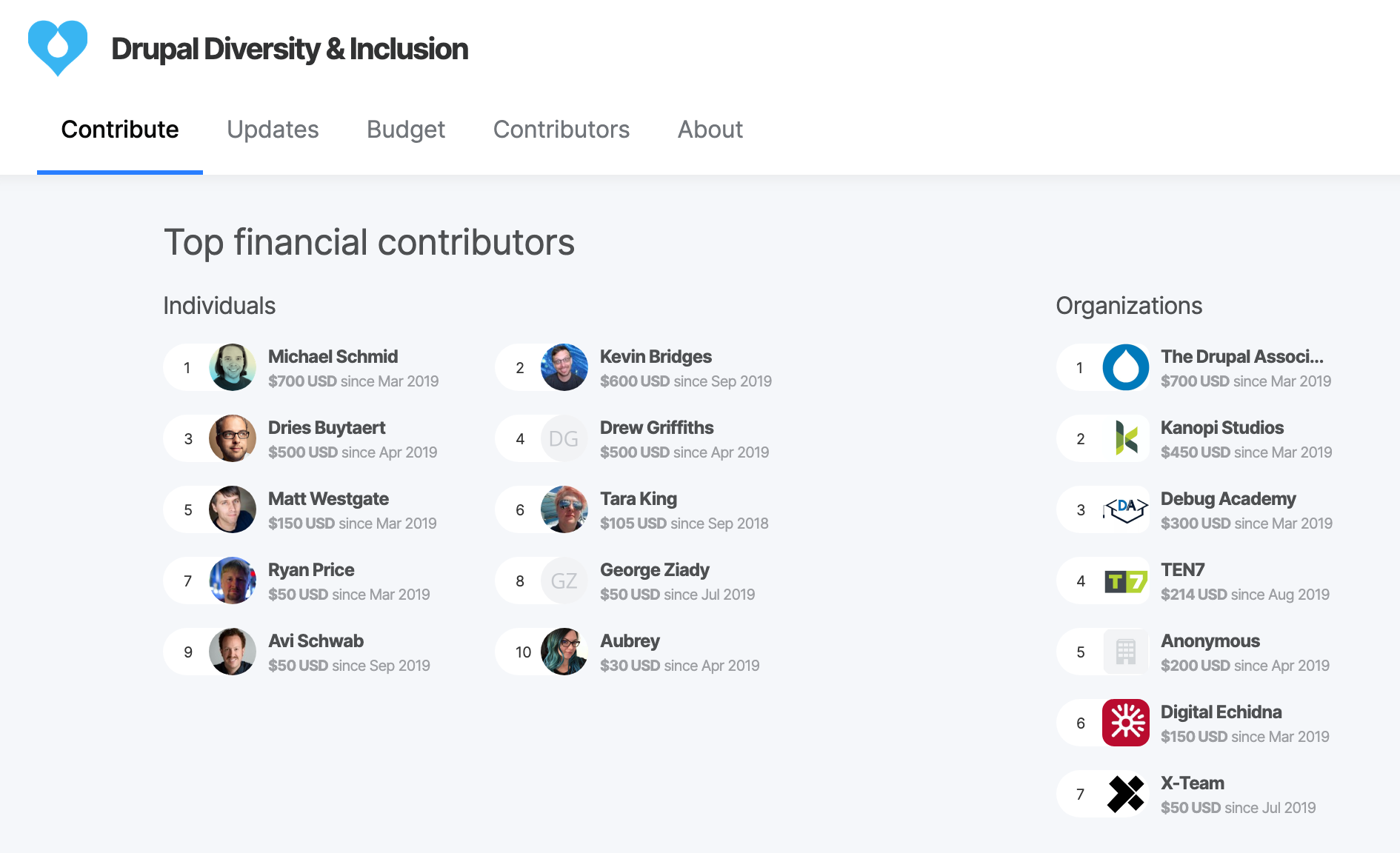
I'd love to see CEOs and CTOs join in. While a lot of companies in the Drupal space say they support diversity, they claim they couldn't possibly hire differently or change their leadership makeup. There's a lot of good intentions without action.
Giving money is comparatively easy. Even $5,000 is cheap compared to changing your CEO. Obviously, what we really want is change in actual practices and decision-making, but we can start with money.
As a community, we're doing a ton of work to support marginalised and underrepresented employees at those companies. We have a lot of support channels, both technical and emotional. We’re helping fix their pipeline. That's work they should be supporting.
We can also look at what Drupal Diversity itself could be supporting. Where could we put in some cash, even though we don't have a ton of it? The more we have, the more we can give.
Who can get involved, and how?
Everyone is welcome. Our focus is on supporting underrepresented groups in the Drupal project.
We have a number of white male allies. We've worked on asking those folks to step up a little bit because their clout is often higher. We had an ally who helped us run a booth once who said, “I’m here to answer level-one questions, because I know you answer them all day. I can explain the basics of why is feminism a good thing so you can handle the more advanced stuff.”
We have some allies on the leadership team. And on DDI Contribution Team, which I started a couple years ago, where people work on the code part of the project. We have some allies who are really experienced and have deep knowledge of the Drupal core.
I would love to see us do better at getting people of color into positions of leadership on our team. Our founder, Nikki Stevens, points out that racism is a white people problem and white people have to fix it. A lot of us see our work as taking one for the team by going out there and having those awful conversations because someone has to. But I'd still like to see us elevating more voices.
If you already give money or you can’t give money, come to our meetings. They happen every Thursday at 9am Pacific time. You’ll hear what’s happening any given week. We're going to Amsterdam DrupalCon, so there's a lot of event planning right now. There's also some code stuff, with a gender field module we're working on.
Join our channel on the Drupal Slack. That's where the largest number of us actively come together. There's a very strong social element, in terms of learning with each other, celebrating successes, and hearing about challenges. Follow us on Twitter, retweet things, and spread the word.
What do you want the world to know about diversity and inclusion?
One thing that’s not talked about enough is the fallacy of meritocracy. The first time I heard that open source does way, way, way, way worse at diversity than proprietary software, I was like, how could that be when anyone can supposedly get involved? Why would this magical utopia of people coming together to work on hard problems together cause that?
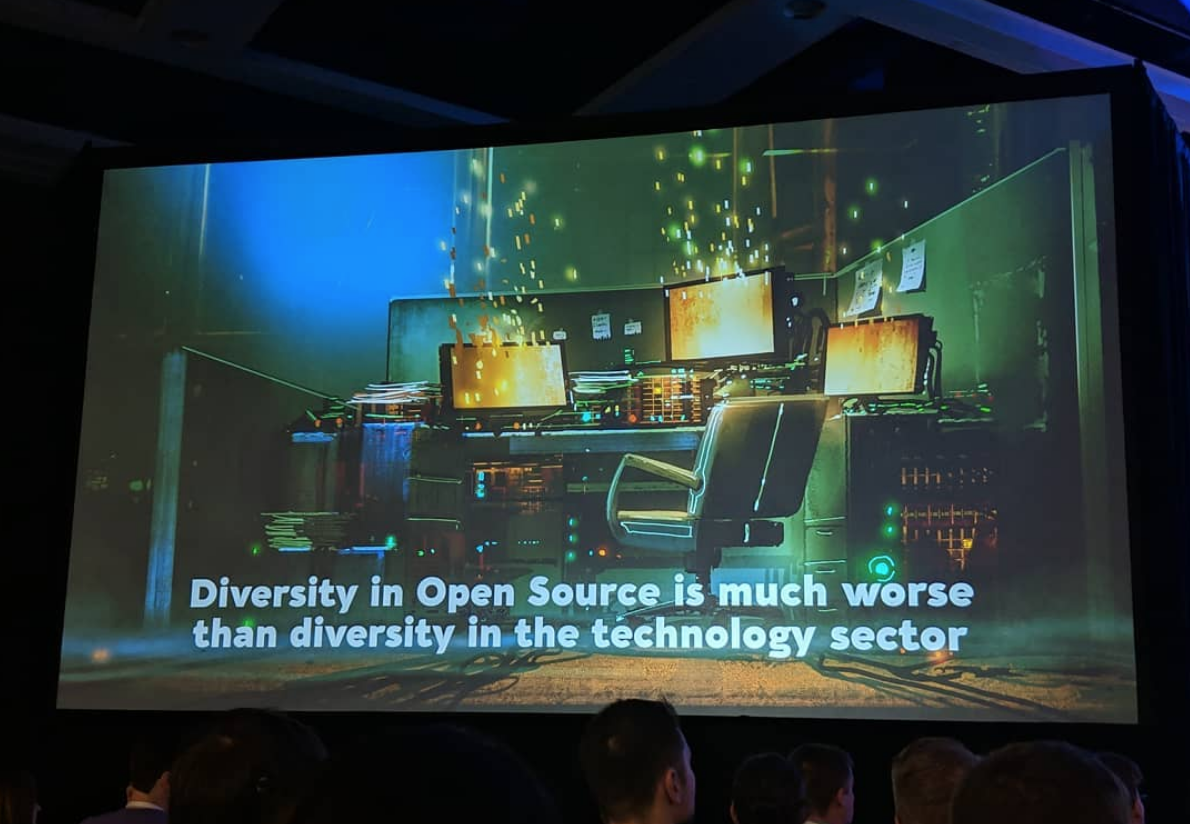
I’ve learned to look closer at how we decide who's the best, how we classify humans, and who we decide to take seriously or treat equally. Saying that the best rises to the top glosses over a whole plethora of problems with how open source gets made.
I value the concept of community health over meritocracy. I'd love to see us start talking about what healthy collaboration practices look like. There are a lot of concepts around community that are way more important than someone being a 10x ninja rockstar coder.
I always think about how much Drupal has improved my life economically. I’ve become infinitely more stable from a financial perspective because I developed these worthwhile skills. The more people who can have that stability, the better.
If Drupal became truly diverse, the contributor base would reflect the breadth of knowledge of the human race, which is incredible. Right now, it's a bunch of people, myself included, who share a lot of the same cultural touch points, and so the software naturally takes on certain opinions. But there are other super important things, like indigenous data sovereignty, that I never would have considered on my own.
I love the magical feeling of working with people on an issue in an open source project. It’s like, this is so fun, I’ve never met you and we don't have anything in common, but here we are working together. It gets more and more magical the more voices are included.
Want to help? Support Drupal Diversity & Inclusion! And if you'd like to join the many Drupal projects raising money and tracking budgets on Open Collective, you can start your own Collective, too.

